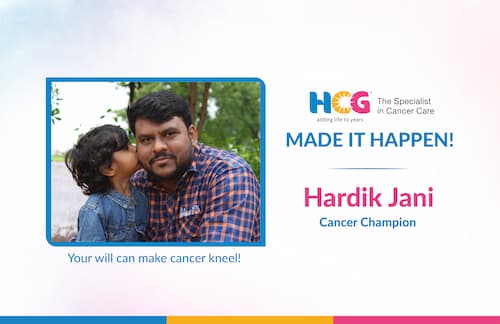HCG, Team

Story of Hardik Jani, 30-year-old Rectal Cancer Winner
At age 30, nobody expects a cancer diagnosis – especially, when you are someone with no ill habits or a family history. The same happened in the case of Hardik Jani. Being a healthy individual, Hardik had no reason to suspect that he had rectal cancer. However, little did he know that a small percentage of rectal cancers are caused due to factors that cannot be controlled.
So, how did he know he had rectal cancer? How did he get treated? How did he rise above the challenge and eventually win over cancer? Read this story to find out more.
Rectal Cancer Diagnosis
Everything was going well for 30-year-old Hardik until he started experiencing an increased frequency of bowel movements and rectal bleeding. He made no delay and immediately got it tested.
When he came to HCG, a full body PET-CT with MRI fusion was performed, and it was confirmed that he had lower rectal adenocarcinoma or rectal cancer.
Rectal Cancer Treatment at HCG Cancer Centre, Ahmedabad
At HCG, treatment plans are devised with the help of multidisciplinary team approach, wherein specialists from various relevant disciplines come together to discuss patients’ symptoms, medical reports, overall health status, etc. before deciding on what works the best for the patient. Treatment plans devised so, are found to be highly effective and also increase the chances of successful outcomes.
Upon thoroughly evaluating Hardik’s case, it was decided that he would be treated with multimodal therapy, i.e., a combination of different types of treatment.
The doctors explained their findings to Hardik and his family, and the treatment began immediately.
Chemotherapy and Radiotherapy: In certain cases, neoadjuvant therapies become necessary as they help in reducing the size of the lesion or tumour, which is important for the surgery to be effective and seamless. In this case, a total of 28 fractions of radiation therapy along with 4 cycles of chemotherapy were administered. An MRI scan was performed 21 days after the last chemo cycle. The doctors found that the size of the lesion had reduced.
Surgery: A team led by Dr. Jagadish Kothari, senior GI & HPB Cancer Surgeon and Robotic Surgeon, and Dr. Bharat Prajapati, GI & HPB Cancer Surgeon and Robotic Surgeon, planned the intervention for this case, which comprised robotic intersphincteric resection, frozen section, colo-anal end-to-end anastomosis, and loop ileostomy.
- Robotic intersphincteric resection: It is the removal of the internal sphincter. This does not affect bowel movements.
- Frozen section: The term “frozen section” refers to the process of performing a rapid microscopic analysis of a tissue sample during surgery.
- Colo-anal end-to-end anastomosis: This procedure attaches the colon to the anus.
- Loop ileostomy: An abdominal cut (incision) is made to remove a loop of the small intestine, which is then opened up and sewn to the skin to create a stoma.
Chemotherapy: After consultation, 2 cycles of adjuvant chemotherapy were recommended.
Four months after the primary surgery, ileostomy closure was done.
Follow-up and Recovery After the Treatment
One year after the treatment, Hardik came for a follow-up visit. All the test reports were normal, and the bowel functioning was excellent.
Advances in the Management of Rectal Cancer Cases
In the past, rectal cancer management often led to permanent colostomy, and this negatively impacted the quality of life of patients. However, in recent times, we have some highly advanced treatment approaches available and organ preservation is possible too – provided the case is diagnosed in the early stages.
Intersphincter resection (ISR) is found to be a highly safe and effective procedure for rectal cancer management. Patients have also found it to deliver satisfactory functional and long-term oncological outcomes. The recurrence rates are relatively low in the case of ISR.
Just like ISR, there are other surgical approaches that significantly improve the clinical outcomes and quality of life for patients.
Bottom Note
Hardik’s sheer will and his decision to go with The Specialist in Cancer Care helped him win over cancer. Today, he is back to leading the life that he led before cancer. His healthy lifestyle deserves a special mention as it positively impacted his recovery.
Having a healthy and active lifestyle goes a long way in reducing your cancer risk to a large degree. Along with this, opting for regular screening also becomes important as it helps in the early detection and timely treatment of cancer.

